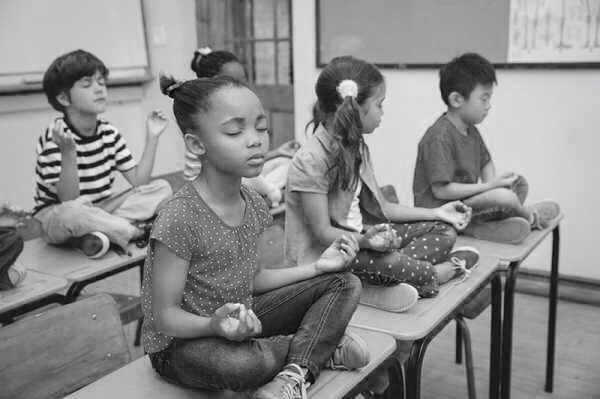Mindfulness is one of today’s most recognizable words. While it may seem like a trend, mindfulness has profound benefits to train the body and mind to reach a state of calm through meditation and yoga. Mindfulness is defined as the basic human ability to be fully present, aware of where we are and what we’re doing, and not overly reactive or overwhelmed by what’s going on around us.
The roots of mindfulness derive from the early teachings of the Buddha and were later expanded in 1979 by Dr. Jon Kabat-Zinn, founder of Mindfulness-Based Stress Reduction therapy at the University of Massachusetts. He designed this treatment for chronically-ill patients to practice exercises such as meditation, yoga, and deep breathing rather than solely focusing on the medical aspects of the illness.
Mindfulness has not only shaped the field of psychology for the chronically ill, educators and school officials have also begun using it for heightening students’ awareness, consideration, and sense of calm. Monica Wolf, an educator and yoga instructor in Massachusetts, has incorporated elements of mindfulness in her classroom before exams and when she needs to create a relaxed atmosphere for the students. Wolf emphasized how the use of mantras builds the students’ confidence and self-esteem. Wolf supported the gratifying impact on the teacher witnessing students respond to the peacefulness of meditation, and how it connects to their mind and body awareness.
Robyn Kyberd, a business strategist in Australia, has recognized the impact of her children participating in meditation lessons at school, particularly with her eldest son. Kyberd noted in a recent interview how meditation has “helped with [her son’s] anxiety and his ability to stop and be in the moment,” the precise benefits Kabat-Zinn predicts for those who practice mindfulness.
In 2003, Goldie Hawn created the MindUp program as a resource for children to learn mindfulness through yoga, deep breathing, meditation and positive communication as part of the academic curriculum. Hawn explained to AARP how a two-minute brain break, practiced three times a day, increases optimism in the classroom by 80% and reduces aggression on the playground by 30%. The effectiveness of the program has led to international growth and today MindUp is taught on five continents in twelve different countries!
Joanne Nistico is a wellness advocate, educator, yoga instructor, and parent who knows first-hand the importance of mindfulness practices. Twenty years ago, long before wellness became a hot topic, Nistico was teaching her children the value of deep breathing as a tool for finding balance and calm. In a recent interview, she stated, “I taught them to say cancel. Cancel to negative thoughts, and to replace it with positive information.” Teaching her children to manage their feelings has encouraged them to maintain this practice in their adulthood through the study of meditation, yoga, and cardiovascular fitness. When asked what her kids enjoyed most about meditation at a young age, she noted, “the security of peace and clarity it offered them. It allowed them to free themselves of the negative self-talk and to appreciate a power higher than themselves,” a defining reason why mindfulness activities remain paramount for today’s youth.
Mindfulness is being taught in some schools, and with data backing the positive impacts of the practice, all schools should implement mindfulness activities into the academic curriculum. Studies have found that youth benefit from learning mindfulness in terms of improved cognitive outcomes, social-emotional skills, and well-being. In turn, such benefits may lead to long-term improvements in life, such as increased education and employment, a decreased likelihood of criminal activity and substance abuse, and greater emotional intelligence in adulthood. From the collected interviews and backed research on the magnificent topic of mindfulness, let’s work together to help this movement thrive and grow for both today’s youth and future generations.

